2023 Fairfield & Suisun City Demonstration Food Forest Garden Tour & Healthy Local Food Showcase is May 6!
Join us for the Fairfield-Suisun City Demonstration Food Forest Tour and Celebrating Healthy Local Food: A Culinary and Garden Showcase on Saturday, May 6!
Sustainable Solano’s self-guided tour of vibrant, waterwise gardens in Fairfield and Suisun City will start with check-in from 9-11 am at Jardin de Esperanza, the garden on Armijo High School’s campus. Park and follow the signs to the garden, where you will be able to sign in and receive an itinerary of gardens to visit. Then tour Jardin de Esperanza and visit the Showcase in the Armijo High School library before heading out to tour the other gardens between 10 am-1 pm!
The tour highlights private and community gardens that use sustainable, waterwise practices to create spaces that provide food, habitat and beauty while capturing rainwater and, in some cases, reusing laundry water in the landscape. Some gardens also show how to make chickens part of a backyard ecosystem. Register here.
In the Showcase, students who participated in the Armijo Healthy Local Food program will share multimedia projects that highlight the importance of growing, cooking and eating healthy food and the importance of local food. Students in the Healthy Local Food program spent weeks learning about the importance of healthy, seasonal, local food by learning culinary skills and how to cook with local produce and meeting in the school garden to connect with growing and understanding our relationship to food. They used their experiences to create multimedia campaigns that include videos, interviews, podcasts, blogs and more!
Explore the multimedia campaigns at your own pace while talking with the students about their work and the program.
We hope to see you there!
Gardens will be open from 10 am-1 pm Saturday, May 6. You can pick up your itinerary for this self-guided tour at the Armijo High School “Jardin de Esperanza” from 9-11 am.
Magical Garden
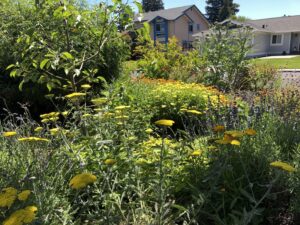 This garden was a front lawn conversion in 2019. It is filled with vegetables, fruits, herbs and more, building healthy soil and harvesting water from the roof.
This garden was a front lawn conversion in 2019. It is filled with vegetables, fruits, herbs and more, building healthy soil and harvesting water from the roof.
Home to hummingbirds, bees, ladybugs and other beneficial insects, the garden sparks conversation with the neighbors and offers bountiful produce to share.
Mom’s Delight
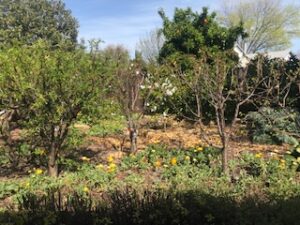 Installed in 2017, this backyard food forest has 21 fruit trees pruned annually to 5 feet, making it easier to access the fruit. The majority of the trees are watered by rain funneled into a swale, while others are watered from the laundry-to-landscape greywater system. An automatic drip system is used during the dry periods. All the fruits are shared with neighbors, friends and family. Additional plantings of salvia and calendula draw in honey bees and hummingbirds.
Installed in 2017, this backyard food forest has 21 fruit trees pruned annually to 5 feet, making it easier to access the fruit. The majority of the trees are watered by rain funneled into a swale, while others are watered from the laundry-to-landscape greywater system. An automatic drip system is used during the dry periods. All the fruits are shared with neighbors, friends and family. Additional plantings of salvia and calendula draw in honey bees and hummingbirds.
Laundry-to-Landscape greywater & backyard chickens
West Winds
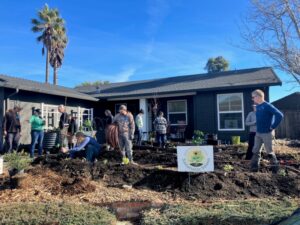 This garden was just planted in January 2023 as a collaborative project between Sustainable Solano and Solano 4-H. Youth members learned about permaculture and designing within the homeowners’ needs, then applied their new knowledge to a plan that includes fruit trees, pollinators and edible annuals. This site is especially susceptible to the western winds, which have annual summer gusts up to 40 mph. The garden is a work in progress as a learning space for 4-Hers for years to come.
This garden was just planted in January 2023 as a collaborative project between Sustainable Solano and Solano 4-H. Youth members learned about permaculture and designing within the homeowners’ needs, then applied their new knowledge to a plan that includes fruit trees, pollinators and edible annuals. This site is especially susceptible to the western winds, which have annual summer gusts up to 40 mph. The garden is a work in progress as a learning space for 4-Hers for years to come.
Backyard chickens
Caisteal Termonn
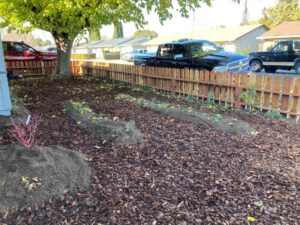 This garden is a demonstration in community and environmental resilience. Homeowners Heidi and Mitch had dealt with a wildfire taking their home in 2020. The garden was designed around a large maple tree, the only thing that survived the fire, and was named in Gaelic to harken back to Mitch’s native Scottish roots. It was installed December 2022.
This garden is a demonstration in community and environmental resilience. Homeowners Heidi and Mitch had dealt with a wildfire taking their home in 2020. The garden was designed around a large maple tree, the only thing that survived the fire, and was named in Gaelic to harken back to Mitch’s native Scottish roots. It was installed December 2022.
El Bosquecito
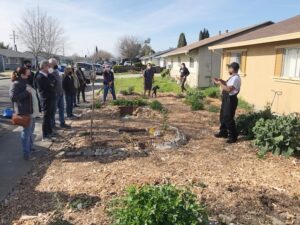 Installed in 2021 to mitigate the effects of flooding, this food forest garden is complete with chickens and a laundry-to-landscape greywater system. This yard has multiple fruit trees and pollinator plants.
Installed in 2021 to mitigate the effects of flooding, this food forest garden is complete with chickens and a laundry-to-landscape greywater system. This yard has multiple fruit trees and pollinator plants.
Laundry-to-Landscape greywater & backyard chickens
We are incredibly grateful for the generous support of our funders. The Solano County Water Agency continues to support the Sustainable Backyard Program throughout the county. Solano Sustainable Backyard Program short videos: Waterwise and Building Gardens and Community.
Armijo High’s garden is supported through our Solano Gardens program and by Innovative Health Solutions.
The Healthy Local Food Program is run through Sustainable Solano, with funding from Solano Public Health and a CA Department of Food and Agriculture grant. Innovative Health Solutions is also a partner that supports the program and receives funding through the CalFresh Healthy Living Program administered through the Nutrition Services Bureau of Solano Public Health. The program is in partnership with Armijo High School and the school’s Multimedia Academy and Garden Club.

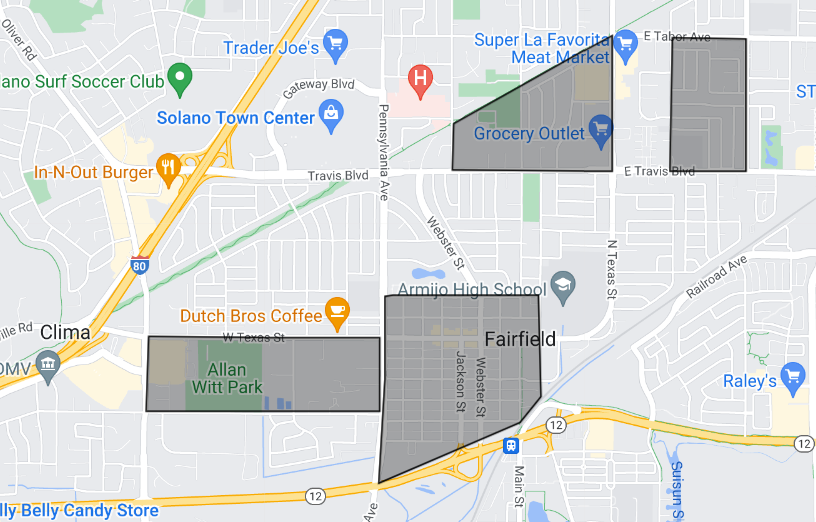
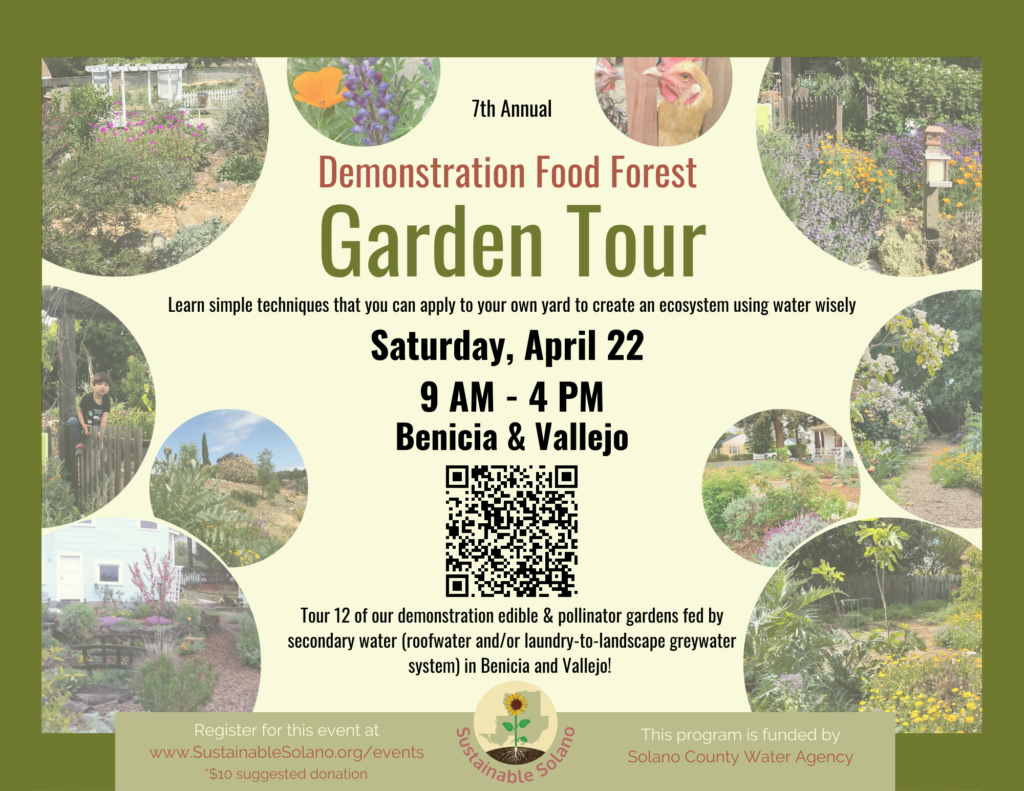
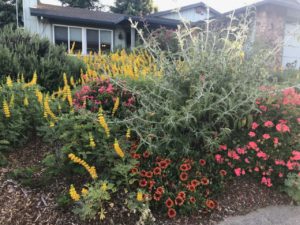 Mature front yard food forest has mostly fruit trees and native plants that attract pollinators year-round. It has a laundry-to-landscape greywater system.
Mature front yard food forest has mostly fruit trees and native plants that attract pollinators year-round. It has a laundry-to-landscape greywater system.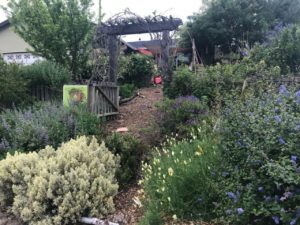 An 8-year-old established food forest with two swales that are dug out and refreshed every 2-3 years, laundry-to-landscape greywater to fruit trees, and chickens. The drip irrigation system was removed three years ago and the garden is thriving! Annual beds are hand-watered once a week during the growing season. Greyhawk Grove is a “high-traffic-survival-of-the-fittest-have-three-young-children garden”. There may be lemonade and baked goods for sale by children, as well as products from the garden to give away (dried calendula, lavender, herbs, eggs, fruit, etc.).
An 8-year-old established food forest with two swales that are dug out and refreshed every 2-3 years, laundry-to-landscape greywater to fruit trees, and chickens. The drip irrigation system was removed three years ago and the garden is thriving! Annual beds are hand-watered once a week during the growing season. Greyhawk Grove is a “high-traffic-survival-of-the-fittest-have-three-young-children garden”. There may be lemonade and baked goods for sale by children, as well as products from the garden to give away (dried calendula, lavender, herbs, eggs, fruit, etc.).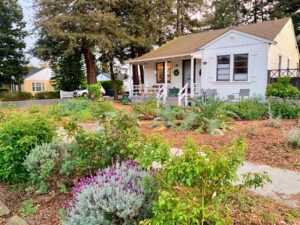 Food forest garden and greywater system installed as part of Sustainable Solano’s 2021
Food forest garden and greywater system installed as part of Sustainable Solano’s 2021 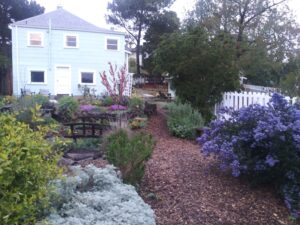 Southern slope food forest focused on pollinators, shrubs and native plants. It also includes fruit trees, perennial and edible plants, swales and a laundry-to-landscape greywater system.
Southern slope food forest focused on pollinators, shrubs and native plants. It also includes fruit trees, perennial and edible plants, swales and a laundry-to-landscape greywater system.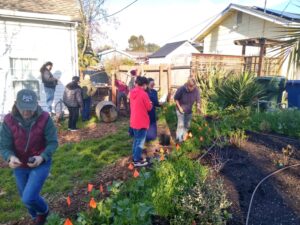 A new and evolving food forest garden and greywater system installed as part of Sustainable Solano’s 2022-23
A new and evolving food forest garden and greywater system installed as part of Sustainable Solano’s 2022-23 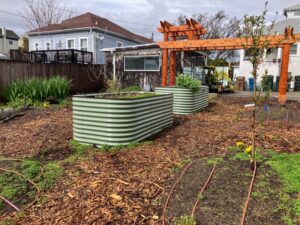 This homeowner attended our tours and was inspired to transform his yard! This brand new garden, designed by Michael Wedgley, is a unique opportunity to tour a stunning and sustainable backyard that showcases the beauty and abundance of permaculture. This eco-conscious backyard features a rainwater catchment system that can harvest up to 3,500 gallons per year, helping to restore the on-site water table, and providing an abundant source of water for this permaculture food forest.
This homeowner attended our tours and was inspired to transform his yard! This brand new garden, designed by Michael Wedgley, is a unique opportunity to tour a stunning and sustainable backyard that showcases the beauty and abundance of permaculture. This eco-conscious backyard features a rainwater catchment system that can harvest up to 3,500 gallons per year, helping to restore the on-site water table, and providing an abundant source of water for this permaculture food forest.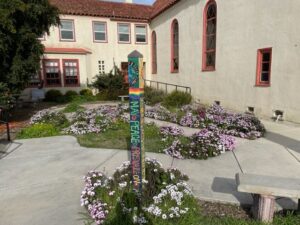 Two separate gardens, one is a peace garden with mostly flowers, cactus and trees and the other is the vegetable garden, called Johnson Ranch. The vegetable garden was revived through the
Two separate gardens, one is a peace garden with mostly flowers, cactus and trees and the other is the vegetable garden, called Johnson Ranch. The vegetable garden was revived through the 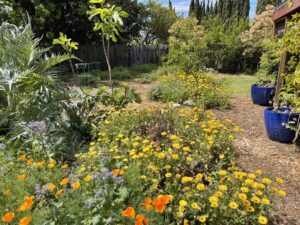 Morningside Botanical Bounty food forest was created as part of the
Morningside Botanical Bounty food forest was created as part of the 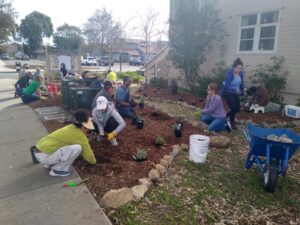 Pollinator food forest garden filled with a variety of California native plants that support the habitat of butterflies, bees, moths, wasps, hummingbirds and so much more. This garden was just installed in February 2023 as a collaboration with a variety of organizations including Vallejo People’s Garden, Vallejo Project, Solano Resource Conservation District and Monarch Milkweed Project. Alanna Mirror wrote three songs inspired by the installation, featured in her
Pollinator food forest garden filled with a variety of California native plants that support the habitat of butterflies, bees, moths, wasps, hummingbirds and so much more. This garden was just installed in February 2023 as a collaboration with a variety of organizations including Vallejo People’s Garden, Vallejo Project, Solano Resource Conservation District and Monarch Milkweed Project. Alanna Mirror wrote three songs inspired by the installation, featured in her 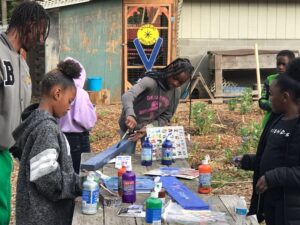 Vallejo Project’s Unity Garden initiative restored an abandoned lot that was once filled with sand and garbage and turned it into a multi-level food forest with internationally influenced farming techniques and 10 chickens. This garden is focused on urban agriculture.
Vallejo Project’s Unity Garden initiative restored an abandoned lot that was once filled with sand and garbage and turned it into a multi-level food forest with internationally influenced farming techniques and 10 chickens. This garden is focused on urban agriculture.